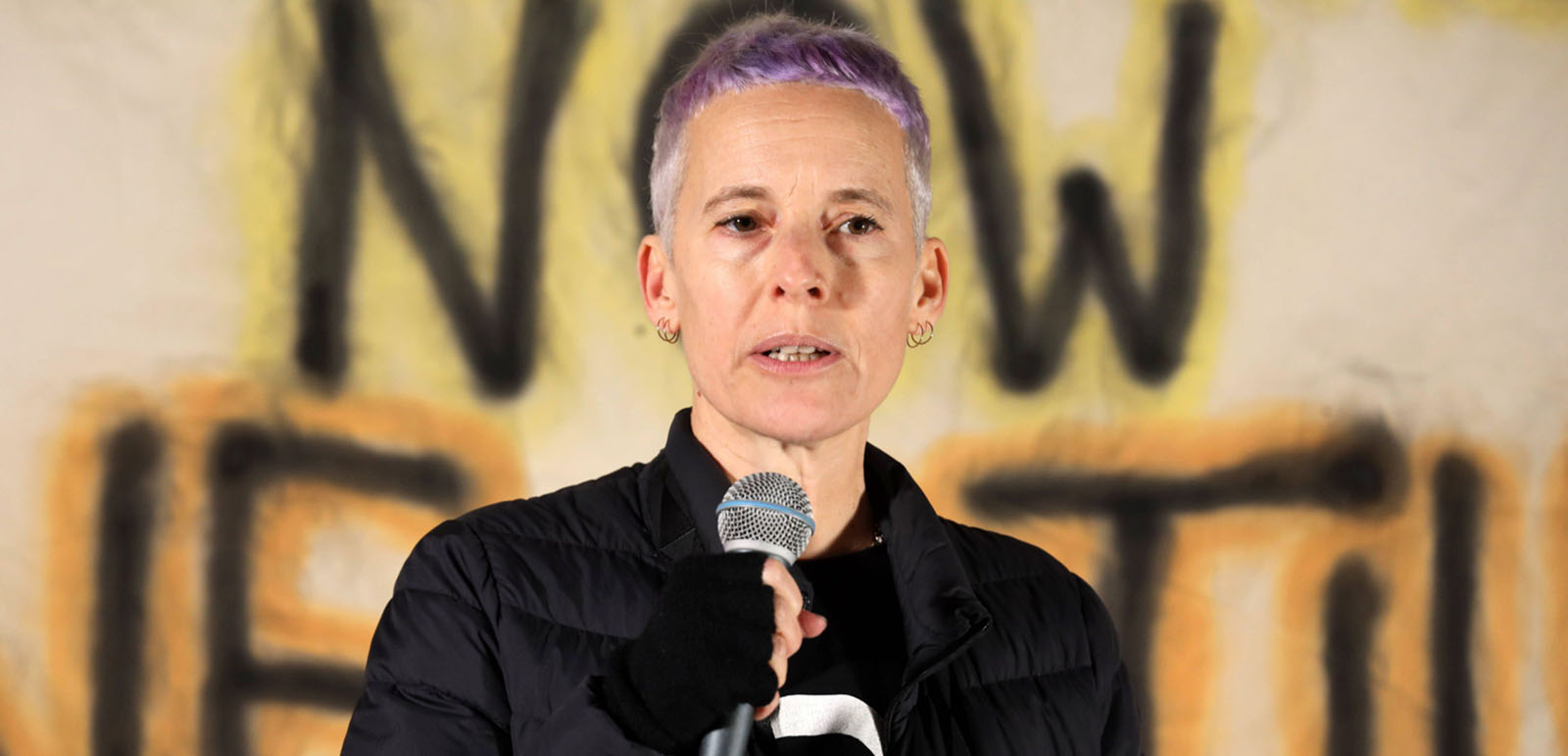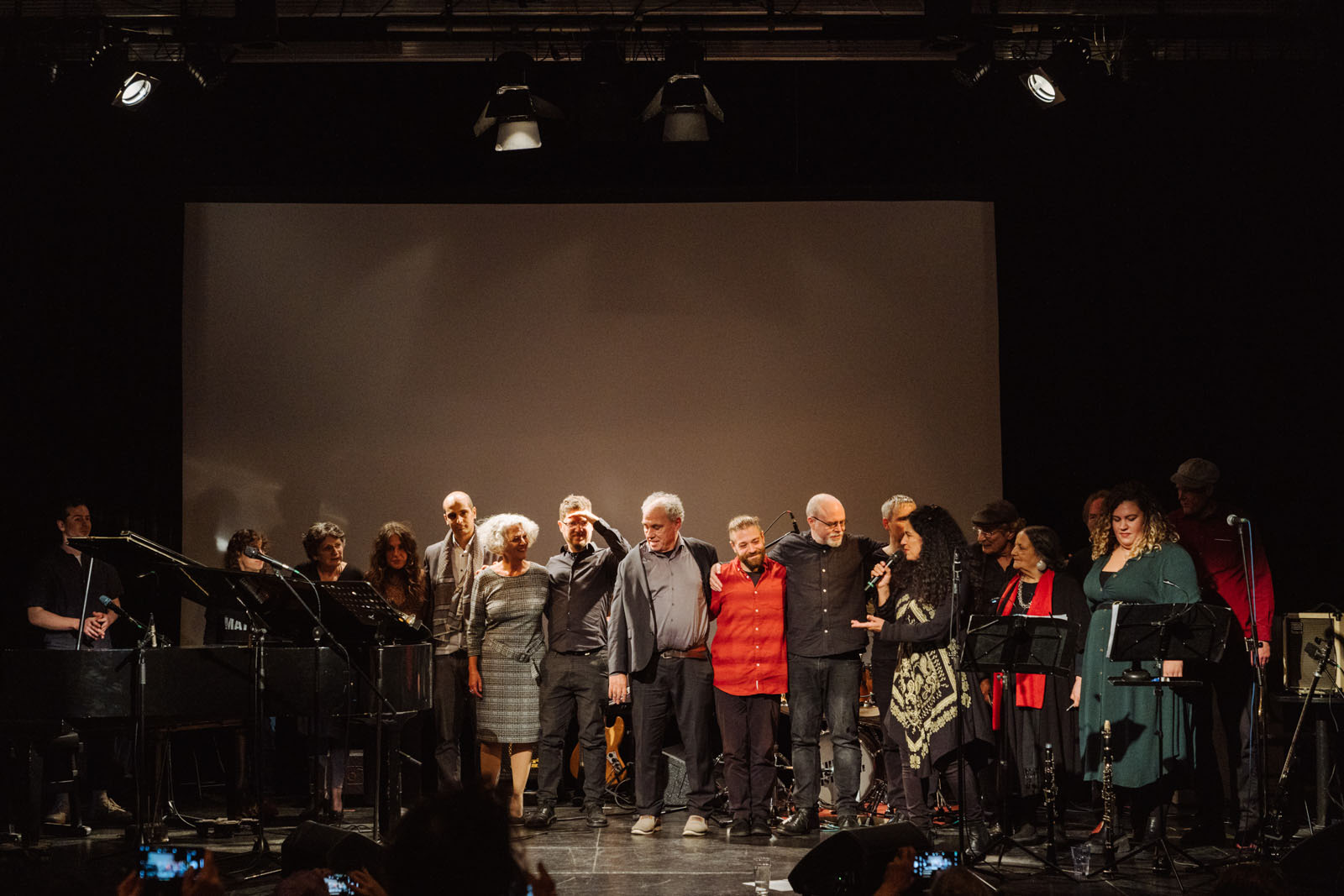A creative community in Germany speaks out for Gaza
Amid a rash of event cancellations, Muslim and Jewish artists and intellectuals are struggling to be heard
–

On Friday 10 November, around 1,500 people gathered for a rally close to Berlin’s Brandenburg Gate. Some people wore kippahs, while others had keffiyehs wrapped round their necks. Many held signs saying “Ceasefire now” and “Release the hostages”. One, painted in the colours of the Palestinian flag, declared: “Jewish safety and Palestinian freedom are not opposing causes.”
Candice Breitz, a Jewish South African artist and one of the demonstration’s main organisers, took to the stage. “In recent years there has been a narrowing of the cultural space in Germany,” she told the crowd. “It has become increasingly hard for certain voices to be heard.”
The rally had been organised by Jewish and Israeli cultural workers to protest against the recent cancellation or postponement of plays, exhibitions and literary readings by artists critical of the Israeli government. It’s a subject Breitz is well acquainted with. We Still Need to Talk — a symposium examining the intersections of antisemitism and racism, organised by Breitz alongside Holocaust studies scholar Michael Rosenburg — was recently cancelled twice, first by the venue Academie der Künste, then by the government agency the artists had partnered with. The official reasons, Breitz told the crowd, were that it was “too sensitive, not the right time”.
“All the while, neo-Nazis continue to march the streets of Germany under police protection, and support for the far-right party Alternative für Deutschland grows,” Breitz said. “How is it possible that our voices are deemed more dangerous to this society than those of white supremacists?”
The horrors of the Holocaust continue to exert a powerful influence on both Germany’s national outlook and its foreign policy. The state has long nurtured a special relationship with Israel and its obligation to support the country is an article of faith for the left and right wings of the political mainstream.
A growing number of people working in the German cultural sector are concerned that this commitment is now in conflict with rights to freedom of expression and assembly. Many also believe that the creative and intellectual spheres are reflecting events on the nation’s streets.
Germany is home to the largest Palestinian diaspora in Europe at an estimated 100,000 people. In recent weeks, tens of thousands have come together in public to mourn those killed in the Israeli bombardment of Gaza. Regional and city governments across the country, however, moved swiftly to stop the gatherings, although some bans were later ruled unconstitutional by courts.
Berlin’s governing mayor, Kai Wegner, spoke in favour of stopping such demonstrations, saying: “Things will happen that none of us want to see on Berlin’s streets.” In the Berlin neighbourhood of Neukölln — a hub of the city’s Turkish and Arab communities — police were accused of beating and pepper-spraying bystanders for carrying or wearing Palestinian symbols, including flags.
Prominent politicians have also taken a sharp anti-immigration turn. Friedrich Merz, chair of the conservative Christian Democratic Union (CDU) of Germany, has called for the country to limit its intake of refugees, and said that the protests have made German society “think about what has been done wrong with immigration in recent years”.
CDU secretary Carsten Linnemann told Bild newspaper that proposed laws to allow foreign-born nationals to hold dual German citizenship, a policy that many immigrants have long wished for, should be scrapped. He said the protests “have shown that neither citizenship nor the mere acquisition of the German language lead to a corresponding integration into our community of values”. Meanwhile, Chancellor Olaf Scholz has stated that deportations of “criminals and extremists” should take place “more often and faster”. He did not offer a definition of extremism.
Two weeks before the 10 November demonstration, 100 Jewish artists, writers and intellectuals in Berlin signed an open letter citing the increasing pressure on individuals and organisations expressing solidarity with the Palestinian people. They pointed out that deplatforming voices critical of Israeli policy means silencing not just Palestinians and Muslims but many Jewish individuals and groups.

One such organisation is Jüdische Stimme Für gerechten Frieden in Nahost (Jewish Voice for a Just Peace in the Middle East). Run by Jewish people living in Germany, the group campaigns for an end to the occupation of Palestine. On 4 November, it hosted a gathering, based on the Jewish mourning tradition of shiva, of around 300 people in a Neukölln arts space named Oyoun.
Attendees shared a meal of eggs, date cookies, and cheese and spinach-stuffed pastries, while speakers hosted a one-minute silence for the 1,400 people killed in the Hamas attacks of 7 October and the — at that time — approximately 9,000 killed in the Israeli onslaught against Gaza.
In the preceding weeks, the Berlin senate had asked Oyoun to cancel the event. On 6 November, the body announced that it was reviewing the venue’s funding. “It seems ironic when Jewish people and groups are labelled or even defamed as antisemitic by German politicians and media,” Oyoun’s management wrote in a statement.
Lili Sommerfeld, 34, a singer-songwriter and former board member of Jüdische Stimme, says she noticed the political atmosphere begin to change in 2019, when the German government voted to classify the BDS (boycott, divestment and sanctions) movement, supported by Jüdische Stimme, as antisemitic. Critics argue that one of the campaign’s key aims — a right of return for Palestinian refugees — would mean the end of a Jewish state. Groups and individuals that either support or refuse to distance themselves from BDS have had events and protests cancelled by local authorities and cultural institutions.
Sommerfeld, who was born in Germany to an Israeli mother, says current events “feel like the next step on a scale that is escalating faster and faster”.
‘I have never seen any place in Germany like it was in Neukölln for the first two weeks after 7 October. I saw people arrested for wearing a keffiyeh.’
In recent years, Berlin has become a gathering place for Arab artists and intellectuals fleeing oppression in their home countries. Now, many are questioning whether their freedoms are truly protected there. Oyoun, which may now lose its funding, is an anti-racist and feminist organisation that aims to give space to those who might usually be excluded from mainstream arts institutions.
It is not the first time the venue has encountered censorship attempts. Co-founder Louna Sbou, a queer Muslim of Amazigh-Moroccan background in her mid-30s, explained that in 2021 the team organised a panel discussion featuring Jüdische Stimme, the advocacy group Palestine Speaks and the Rosa Luxemburg Foundation, a left-leaning policy and educational institute. Berlin’s then culture minister Klaus Lederer, who belongs to the Left Party, phoned Oyoun and said the organisation could lose its funding if it didn’t cancel the event. His reasoning was Jüdische Stimme’s inclusion.
“I had always thought the Left Party was pro-dialogue and pro-democracy,” Sbou said.
Both police and politicians have scrutinised Oyoun’s programming ever since. “Berlin state secretary Sarah Wedl-Wilson told her in a September meeting about the recent event that the principles of artistic freedom have to end when art becomes “too politically charged”, but did not define what the limit might be. Police often arrive at the venue unannounced — in uniform and plain clothes — to browse or ask questions about forthcoming events.
The situation has left both those who work for Oyoun, some of whom have visas dependent on their employment there, and the communities that use it in a vulnerable position.
Sbou’s colleague Tariq Bajwa, 36, said that many Muslim and Arab artists in Berlin “are questioning their existence here in terms of living and working when we see how politicians are reacting and how so many events are being cancelled”.
In response to a request for comment from Hyphen, a Berlin Culture Senate spokesperson said: “Freedom of art and freedom of opinion is a valuable asset in Germany and we are committed to protecting it. However, this does mean that the institutions and projects we support must operate within democratically defined boundaries.”
They added that the body was “reviewing the continuation of our funding” for Oyoun and would not be making any further comment.
German authorities have argued that event and protest cancellations are necessary to protect the Jewish community against rising antisemitism. A small minority of Muslims have expressed antisemitic views. In one now-notorious incident, around 50 men handed out baklava in Neukölln to celebrate the Hamas attacks, leading some German Jews to say they felt unsafe.
Others — including Breitz, and the writers of the open letter — have highlighted that the greatest threat to Jews in the country comes from the far right. Government statistics estimate that more than 80% of antisemitic attacks are perpetrated by rightwing extremists and show that hate crimes targeting Jews were increasing before 7 October.
Some German Jews also question whether the heavy policing of Arab communities will actually make them safer.
“I think it fosters feelings of hatred and competition and plays two minorities off against each other,” said Emma, 37, a social services worker. She asked to be identified by her first name for fear of professional repercussions. “We [as Jews] become the projection for people’s feelings of frustration and powerlessness,” she said.
While reporting this story, several people voiced fears that the German far right would use present tensions to its advantage, ratcheting up antisemitic attacks and blaming Muslims to shift political discourse in an anti-immigration direction. Some recent antisemitic incidents, including the vandalism of a synagogue in Rhineland-Palatinate, point to far-right perpetrators.
Berlin’s creative community, meanwhile, has decided that if it is not allowed to speak up in institutions, it will do so on the streets. “A healthy democracy must include a wide variety of voices,” Breitz told the crowd on 10 November. “We have learnt the lessons of the Shoah. We have learnt the lessons of the Holocaust. Never again means never again — for anyone.”
Topics
Get the Hyphen weekly
Subscribe to Hyphen’s weekly round-up for insightful reportage, commentary and the latest arts and lifestyle coverage, from across the UK and Europe
This form may not be visible due to adblockers, or JavaScript not being enabled.